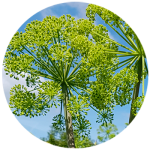Angelica
-
- A paralled, randomized, double-blind, placebo-controlled study to investigate the effect of Angelica archangelica on nocturia in men. Objective. This study aimed to investigate the effect of Angelica archangelica leaf, on nocturia. Material and methods. Sixty-nine male patients 45 years or older with at least two nocturnal voids were randomized to receive Angelica archangelica or placebo in a double-blind design for 8 weeks. Voiding diaries were assessed before and after the treatment. Results. The results indicate that Angelica archangelica is safe. The actual number of nocturnal voids (ANV), nocturnal polyuria index (NPi) and nocturnal bladder capacity index (NBC index) decreased in the test population, but there was no significant difference between the treatment groups. Subsequent subgroup analysis showed that Angelica archangelica significantly reduced the NBC index and nocturnal voids per sleeping hour in comparison to the placebo in participants with baseline NBC index above 1.3. When participants with sleep disorders were excluded from this group, ANV was also significantly reduced for the Angelica archangelica group in comparison to the placebo group. Conclusion. Angelica archangelica , made from an extract of the medicinal herb Angelica archangelica, is safe. This study did not show that Angelica archangelica improved nocturia overall compared to placebo. Subgroup analysis suggested a beneficial effect in individuals with decreased nocturnal bladder capacity, which warrants further study. [Sigurdsson S, Geirsson G, Gudmundsdottir H, Egilsdottir PB, Gudbjarnason S. A parallel, randomized, double-blind, placebo-controlled study to investigate the effect of Angelica archangelica on nocturia in men. Scand J Urol. 2013 Feb;47(1):26-32.]
- Antitumour activity of Angelica archangelica leaf extract. Background: The purpose of this study was to examine the effect of a leaf extract from A. archangelica on the growth of Crl mouse breast cancer cells in vitro and in vivo. Materials and Methods: The antiproliferative activity of the extract was measured by 3H-thymidine uptake in the Crl cells in vitro. Twenty mice were injected with the Crl cells, and 11 of them were fed A. archangelica leaf extract, and the progress of the tumours was followed. Results: The leaf extract was mildly antiproliferative on the Crl cells with an EC50 of 87.6 Ìg/ml. The antitumour activity of the extract was expressed in the mice by marked reduction in tumour growth. In the experimental animals, 9 out of 11 mice developed no or very small tumours, whereas control animals, not receiving the extract, developed significantly larger tumours (p<0.01), as estimated by Mann-Whitney U-test. The antitumour activity of the leaf extract could not be explained by the antiproliferative activity of furanocoumarins present in the extract. Conclusion: The results demonstrate the antiproliferative activity in vitro and antitumour activity in vivo of a leaf extract from A. archangelica. [Sigurdsson S, Ogmundsdottir HM, Hallgrimsson J, Gudbjarnason S. Antitumour activity of Angelica archangelica leaf extract. in vivo. 2005;19:191-194.]



